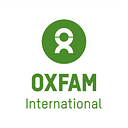4 Ways Europe Can Ensure a Fairer, Safer and Greener World
Toward securing a European Union that works for people, here are four priorities for the new European Commission.
An open letter to the 27 new European Commissioners. By Marissa Ryan, Oxfam International Deputy Director for Advocacy, and Head of Oxfam’s EU office
Dear Commissioners,
Over the next five years, you will lead European Union’s action to build a fairer, safer and greener Europe in the world.
This is both a worthy and challenging task. Right now, inequality between rich and poor, and between women and men is rampant. Conflicts are displacing millions of people from their homes and causing egregious human rights violations, while the climate emergency threatens to destroy the livelihoods and the future of both our people and planet.
The European Union can — and must — tackle these issues.
Oxfam has identified four priorities that the new Commission, working together with the European Parliament and member states, should address as a matter of urgency.
1. Fight the growing inequality crisis
Current levels of global inequality are socially and economically unsustainable, and they threaten the progress made on eradicating poverty within and beyond Europe. Inequality is also sexist: women contribute around EUR 9 trillion in unpaid care work; they make up the majority of lowest paid workers, suffer violations and indignity in unsafe working conditions and are denied access to opportunities and a voice of their own.
On top of this, tax avoidance by multinational companies means developed and developing countries lose huge amounts of income every year that governments could spend on public services proven to lessen inequality, such as healthcare and education. The EU must build a fairer and more progressive tax system that ends tax dodging and contributes to sustainable development.
Inequality is also rife in the supply chains of many products sold in the EU: big European companies put undue pressure on their suppliers, which results in terrible labour conditions and environmental devastation. The EU should introduce rules on mandatory human rights due diligence that force companies to root out unfair and unsustainable practices throughout their supply chains.
2. Take decisive action to tackle the climate emergency
Millions of people worldwide are already suffering from the devastating impact of the climate crisis. Yet Europe continues to fall short on meaningful progress towards reaching the 1.5-degree target of the Paris Climate Agreement.
We cannot afford this. Climate change and its impact on food security and livelihoods perpetuates global poverty, heightens the risk of conflict fueled by resource scarcity, and increases gender inequality. In short, the climate crisis threatens to undermine all other efforts to create a safe and stable global future.
To address this emergency, the EU must implement policies in line with the Paris Agreement, and go beyond this: we need a binding climate target that reduces emissions by 65 per cent by 2030, and a complete decarbonization of the economy by 2050.
Moreover, it’s essential that the EU increases its climate aid to developing countries to allow them to adapt to, and manage, the worst effects of climate change, and lower their emissions.
3. Create a fair asylum system for people seeking protection
In 2018, over 70 million people were forcibly displaced, most of them within their own countries or regions, and a small fraction of them are seeking asylum in other countries. In the same year, over 2,200 people died trying to reach Europe in search of safety and dignity.
The reception systems in the EU’s main countries of arrival, especially in Greece and Italy, are over capacity. People are stranded in overcrowded and unsafe living conditions, and authorities fail to provide people seeking asylum with the even the most basic needs like toilets, showers and decent food, let alone services like healthcare or education. Many of those who have fled war, conflict and persecution are denied a fair asylum process, without legal aid or access to clear information on their circumstances. This is a violation of European and international law.
EU member states have a shared responsibility to build an asylum system that is safe, fair and effective, as well as to host refugees and help them reunite with their families. Europe also needs to implement search and rescue operations to help save the lives of those seeking safety.
4. Ensure development cooperation and humanitarian aid works for people in need
The EU was founded on the values of human dignity and equality of opportunity. However, in recent years, EU foreign and development policies have prioritised the privatisation of aid, trade partnerships that advantage the elite, and are wholly preoccupied with ‘tackling migration.’
This needs to change. The EU should focus its external action agenda on alleviating humanitarian need, supporting sustainable development and eradicating inequality. EU assistance is vital to saving lives and the building of peaceful and just societies where the human rights of all citizens are upheld.
The EU should support civil society and human rights defenders, particularly women human rights defenders, to ensure that their views and experiences are reflected in political dialogue and action at national and multilateral level.
Now is the time to act
The new College of Commissioners will be launched at a critical juncture. The EU has the power and resources to help build a better world, ensuring a safer, fairer and greener future for all people. We need our leaders to be bold and visionary in their action.
Now is the time.
This entry posted on 27 November 2019, by Marissa Ryan, Oxfam International Deputy Director for Advocacy, and Head of Oxfam’s EU office.
